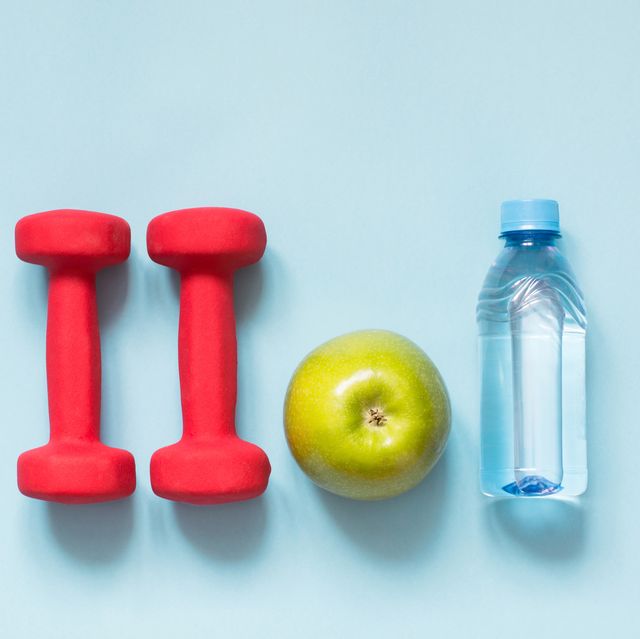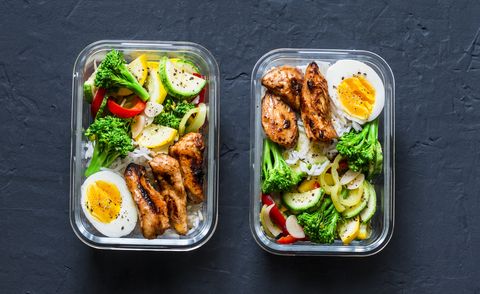15 Small Changes You Can Make to Lose Weight Faster, According to Health Experts

If your goal is to lose weight and exercise more, forget the deprivation diet and marathon workouts. Research shows that taking small steps—not giant leaps—is the best way to get lasting results.
Research shows that people who adopt smaller, positive changes to their lifestyle, such as drinking more water or walking five more minutes each day, lose more weight and keep it off.
 The Tropical Secret for Healty Weight Loss Know more
The Tropical Secret for Healty Weight Loss Know more
"When you focus on just a couple of small changes at a time, you begin to ingrain some healthy habits that last for a lifetime, rather than trying an all-or-nothing approach that more often than not fails because it's too hard to follow," says Lesley Lutes, PhD, a professor of psychology who specializes in obesity prevention at the University of British Columbia.
To help you move more, eat less, and look and feel better, we rounded up the best weight-loss tips from health experts.
1. Keep a food journal
Mindlessly munching on a bag of chips could result in easily polishing off the whole thing. But writing down all the meals and snacks you've eaten can help you practice better portion control. It will also help you figure out how you can make smarter food choices. For example, if you're hankering for a bag of potato chips around 3 p.m. at the office every day, keep a bag of cashews by your desk so you're not making a trip to the vending machine.
Journaling can also serve as a reality check on your other eating habits, says Lutes. Do you skip meals? Eat the same meals during the week as on the weekend? Binge eat when you're feeling stressed? "Knowing your routine helps you figure out what changes are right for you," she adds.
2. Find every opportunity to move more
And we're not just talking about going for a walk during your lunch break. Get moving during your favorite TV shows. Do jumping jacks, run in place, go up and down some stairs, start dancing—anything that gets your heart rate up so you feel somewhat breathless, says Geralyn Coopersmith, a certified strength and conditioning specialist and chief content officer for Flywheel Sports. Do it for each 2-minute commercial break while you're watching your favorite TV show, and you'll burn an extra 270 calories a day—which can translate to a 28-pound weight loss in a year.
3. Limit packaged, processed foods
Packaged foods tend to be high in sodium, fat, and sugar, so you want to try to limit them as much as possible from your diet. Pick your top five processed foods, whether it be cookies, crackers, chips, or candy, and gradually downshift. "If you're eating six of these foods a week, try to go down to five," Lutes advises. Each week, drop another food until you're at no more than one or two. At the same time, replace them with healthier snacks, like baby carrots with hummus, Greek yogurt and fresh berries, or natural peanut butter with an apple.
 The Tropical Secret for Healty Weight Loss Know more
The Tropical Secret for Healty Weight Loss Know more
4. Go on more walks throughout the day
Americans use their cars for two-thirds of all trips that are less than one mile and 89 percent of all trips that are one to two miles, yet each additional hour you spend driving is associated with a six percent increase in obesity. Burn calories instead of gas by following this rule: If your errands are less than one mile away, walk to do them at a brisk pace. Or, park your car, where you can run several errands within a mile, instead of moving your car each time.
According to the U.S. Department of Health & Human Services, adults should get at least 150 minutes—2 hours and 30 minutes—to 300 minutes—5 hours—a week of moderate-intensity, or 75 minutes—1 hour and 15 minutes—to 150 minutes—2 hours and 30 minutes—a week of vigorous-intensity aerobic activity.
6. Incorporate strength training into your routine
Basic bodyweight exercises, like squats and push-ups, are a simple way to build more metabolism-revving muscle in minutes at home without picking up a single weight. "Your muscles don't know the difference between working against your body's own resistance and on a fancy piece of equipment," says Wayne Westcott, PhD, fitness research director at Quincy College. "The one rule to follow is that each exercise should fatigue your muscles within 60 to 90 seconds," he says. For extra burn, you can add an resistance band to basic moves.
Try this mini-workout: Do 10 reps each of knee push-ups, squats, crunches, lunges, and chair dips. Then gradually increase the number of reps it takes for your muscles to feel fully fatigued.
7. Use the stairs whenever possible
Have a choice between riding and climbing? Adding two to three minutes of stair climbing per day—covering about three to five floors—can burn enough calories to eliminate the average American's annual weight gain of one to two pounds a year. Walking up a flight of stairs can also help strengthen your glutes and quads, so there are some strength training benefits as well.
8. Use a fitness tracker
Today's fitness trackers allow you to take more control over your health by providing you with important data about your eating, sleep, and workout habits. Consider purchasing a fitness tracker to help you monitor not just how many steps you're taking each day, but how many calories you're burning, how much sleep you're getting, what your resting heart rate is, and what your eating habits are like. It'll also help you stay on track with sticking to the goal of getting 150 to 300 minutes of moderate-intensity exercise a week.
9. Prepare your own lunch
You'll save thousands of calories—not to mention hundreds of dollars—over the course of a year if you pack your lunch more often. For example, a pre-made chicken Caesar wrap from a chain restaurant has 610 calories—40 percent of which come from fat. It also has 1,440 milligrams of sodium, which is more than half the recommended daily amount.
 The Tropical Secret for Healty Weight Loss Know more
The Tropical Secret for Healty Weight Loss Know more
Make your own with sandwich at home with chicken breast on whole-wheat bread with light mayo, tomatoes, and Romaine lettuce. This will help you cut calories and sodium. "When you make and eat your own food, you not only control the quality and portion sizes but also reduce the amount of sugar, salt, and fat that you're consuming, which can be significantly higher in restaurant fare," says Ashley Koff, RD, a registered dietitian based in Washington, D.C.
10. Enjoy dessert
It might sound contradictory to treat yourself to dessert when you're trying to lose weight, but the truth is, depriving yourself of treats can lead to overeating. Instead, portion out one serving of your favorite treat. Take a minute to smell it, look at it, and savor each bite. Chew slowly, moving it around your mouth and focusing on the texture and taste. As you do this, ask yourself whether you want another bite or if you feel satisfied. Tuning into your body will help you eat more mindfully and feel more satisfied.
"When you take the time to slow down and be more mindful of what something really tastes like, you'll feel more satisfied," says Lutes. "Many people will find that they're content after just a couple of bites and are better able to stop eating when they're satisfied," she explains.
11. Sip wisely
Skip fruit juice, which tends to be loaded with sugar, and enjoy a healthy smoothie instead. Smoothies are a much healthier choice than fruit juices because they keep the fiber from fruits and vegetables intact, making them more filling and nutritious. But not all smoothies are created equally. It's important to prepare a smoothie that has a good balance of protein, carbs, and healthy fats. That means not loading it up with just fruit. Get muscle-building protein from protein powders, low-fat milk or unsweetened nut milk, Greek yogurt, or oatmeal. Add volume and extra fiber from dark, leafy greens, frozen cauliflower and other veggies. Top your smoothie with chopped nuts for a boost of healthy fats.
To promote satiety, eat your smoothie in a bowl with a spoon, rather than slurping it down with a straw. "When you chew a food, you generate more saliva, which in turn carries a message to the brain that your gut needs to get ready for digestion," explains Koff. "Drinking doesn’t require such digestion, so the body doesn’t register that it’s full as quickly."
12. Stay hydrated
Sometimes you confuse thirst for hunger, which can cause you to eat more food than you actually need. So it's important to stay hydrated and drink sips of water throughout the day. Water is also key to better digestion and a revved-up metabolism. You've probably heard the golden rule that you should drink eight glasses of water a day, but the amount of water each person should drink varies greatly. People who are very active, take certain medications, or have a viral illness need to drink more water. The best way to make sure you're properly hydrated is to drink water whenever you feel thirsty and to take sips of water before, during, and after a workout. You can also stay hydrated by eating more water-rich fruits and vegetables.
13. Team up with a workout buddy
Exercising with a friend helps you stay accountable and able to stick with your workout. Nobody wants to leave a pal stranded on a street corner at 6 a.m., but your workouts don’t always have to be done face-to-face. If you subscribe to a weight-loss app, join the community boards and challenges, where you can find people with similar goals and share your progress.
14. Lighten up your coffee order
A regular cup of coffee with a dash of milk and even a little sugar has hundreds of fewer calories than the blended drinks, which are practically dessert in a cup. You can easily lighten up your coffee order without sacrificing taste by opting for low-fat milk or an unsweetened nut milk, adding just a touch of honey for sweetness, and a dash of cinnamon for flavor.
15. Get enough sleep
Make a point to go to bed earlier, and you’ll notice a difference in your energy levels and mood. Research shows that just a few nights of sleep deprivation can lead to almost immediate weight gain. That's because when you don't get enough sleep, you're not able to make healthier choices throughout the day. When you're tired, you tend to compensate with fatty and sugary foods. You also want to take a close look at your nighttime habits. Is dinner your biggest meal of the day? Are you having too many midnight snacks? These habits could be messing with your weight-loss efforts.




0 Comments